20/06/2016
by Antonino Siniscalchi
I am almost sad that this new novel, “Dance The Love - A Star in Vico Equense”, concludes “The Sorrentine Trilogy” by Raffaele Lauro, for me simply “Prof”. So this amazing cultural celebration of our coast inaugurated with “Sorrento The Romance” and continued in “Caruso The Song - Lucio Dalla and Sorrento”, the creation of which I observed, seems to be concluding. The end! I have read the previous novels and I presented them in public, but the latter involved me more than others, because it talks of love, love for art, love for a person, Fernando Savarese, love for a country, love for nature and love for beauty.
It must also be the age, maybe I'm getting old (I hope only on paper), but I was truly moved. I find the final scene of the novel, the “dream” of Violetta Elvin returning to dance on the stage of the Bolshoi at the age of ninety, wonderful, crazy and visionary. Nevertheless, as a reporter with my ears pricked, and as an informed man from Sant’Agata, I sensed some new bubbles in the Professor's “pot”: long interviews with Livia and Alfonso Iaccarino, a research on the development of Sant’Agata from the nineteenth century until today, visits to the spring of Canale, to Deserto, Hotel Iaccarino and Agerola, and consultations at the National Library of Naples, in the section of Lucchesi Palli, of the manuscripts by Salvatore Di Giacomo – all this foretold something new. But back to us, to the topic present in the novel, but not discussed yet: the gastronomy of the Sorrentine coast, my particular interest having followed for years in Il Mattino, in the gastronomic column of the Agenda del Sole, the Friday supplement of the newspaper directed at the time by Pasquale Nonno, the emergence of many of our starred chefs, who today become TV stars and are chased for jobs like football managers.
D: The gastronomy of the coast occupies a privileged place also in the other two novels in the Sorrentine Trilogy. From the culture of cuisine to the culture of dance?
R: The culture of an area cannot be confined in a museum or in a library, which although important in their role as custodians of the past, do not cover the spiritual dimension of a special community, such as ours, from anthropological point of view. Even more so, in a land that for centuries has made the art of courtliness its socio-economic speciality, our heritage of identity is also enriched by the relationship with agricultural cultures, with the transformation of farmed products and the close bond with the quality and variety of food offered to guests from around the world. Let’s imagine for a moment, that the crops of oranges, lemons and walnuts had not been introduced centuries ago in the Sorrentine Peninsula. It would have been of harm also for musical compositions! Maybe “Torna a Surriento” or “Caruso” wouldn’t have been created at all! Provolone del Monaco is not an accident of history, but the final point, the excellence of work, symbolizing Monti Lattari without wanting to go too far back in time to the ancient history. The Mediterranean maquis provided and provides all the flavours of berries and herbs, which with natural, unique and unrepeatable tastes enhance traditional and innovative country dishes of the Mediterranean diet, the result of intelligence, creativity and passion of our great chefs: from the “starred” ones to young chefs, who bloom every summer in restaurants and kitchens of large hotels.
D: A mix of tradition and innovation in the schools of gastronomic thought by our chefs?
R: I would call them authentic philosophies, although diversified, well anchored, yet all linked to genuine products of the earth and to the review of the past, without ever betraying flavours and natural scents. I usually compare our chefs, starred or not starred, to the artists-craftsmen of the Renaissance workshops of Florence in the fifteenth and sixteenth century. It is no coincidence that in my historical novel, the first one of the trilogy, I called the chef of Casa Correale Alfonso, in honour of the master-prince of our chefs, Alfonso Iaccarino. Nor is the result of improvisation the constant reference in the second novel, dedicated to Lucio Dalla, to the predilection of the great artist from Bologna for the Sorrentine cuisine and the fruits of our land and our sea, this simple and not manipulated power, with a must: beefsteak tomatoes, mozzarella and basil.
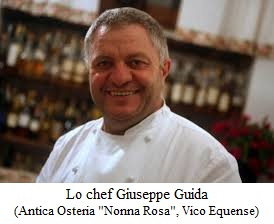 D: I read that Violetta Elvin since 1951 has not been indifferent to the fruits of the earth and sea of Vico Equense.
D: I read that Violetta Elvin since 1951 has not been indifferent to the fruits of the earth and sea of Vico Equense.
R: Like all dancers, Donna Violetta has always eaten and eats little, very little, but that little should and must be genuine. Art does not allow manipulations. This encouraged, I do not say determined, the artist’s marriage to Vico Equense. The novel begins on the protagonist’s birthday (the ninety-second birthday), with the celebration dinner organized by her close ones at Antica Osteria "Nonna Rosa" under direction of maestro Peppe Guida. Not even this detail appears to be random, even if it’s completely true! Although, Donna Violetta’s culinary baptism dates back to her first visit in Vico Equense in 1951.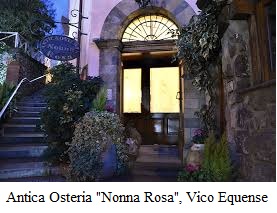
D: It was very amused to read of the “pagnottelle” in the packed lunch that the Aequa hotel, where she was staying, prepared for her and her English friends for the hike on Mount Faito and Mount Comune!
R: To avoid losing time by eating on the hill before or after the climb to the top, as at that time there were no taverns, guest houses or eateries on the mountain, Violetta Elvin and her British friends brought packed lunches prepared in the hotel, full of delicious things, with water bottles and small flasks with straws, never seen before, filled with white and red wine. Instead of packed lunches, or lunch bags, those individual packages could have been called the “maccaturi lunches”, as they contained large checked plaids (maccaturi), red and blue, with tablecloths from the same fabric to lay down on the grass and lean over the groceries. Everything was packaged properly, in order not to force the walkers to use cutlery. A kind of a large sandwich, which the locals called “pagnottelle”, with fresh crusty bread and different fillings. Each of them got three loaves in a crescendo of flavours, which at mid-day was an exciting surprise for those British palates, and greeted with repeated wine toasts, which helped fuel the common joy. The fillings: slices of beef steak tomatoes interspersed with mozzarella and basil leaves, a little olive oil, a pinch of salt and a sprinkling of oregano; cutlets a la Milanese enclosed in large leaves of cappuccina lettuce cultivated in the garden of the hotel, and eggplant parmigiana with mozzarella, basil and tomato sauce. This last and most succulent loaf provoked applauses... and made them speechless!
D: The highlight, however, as I recall, was the lunch at the house of Savarese: a salad with fresh octopus and baked pasta? Is that so?
R: You remember well. Fernando’s mother prepared for Violetta Elvin her (famous) baked pasta, a specialty of Ischia where she came from, with fried eggplant, mozzarella cheese, country tomato sauce and lots of basil. Fernando went at dawn round all the beaches of Vico, waiting for the return of fishermen to “seize” all caught octopus. With those, his mother prepared also a special octopus starter, salad, olives, a little oil and lemon juice from freshly picked lemons. A mixture of scents of the sea, orchards and gardens of Vico Equense. A scent that is not found in any other part of the world. The appreciation was expressed not only by second helpings both of the starter and pasta but, in particular, by Violetta's exclamations. Wonderful! Wonderful!
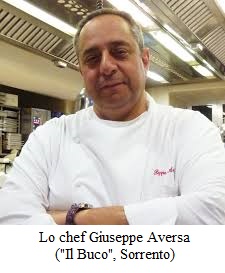 D: Octopus slaves, then! Don’t forget that Donna Violetta dined in the summer, with her husband Fernando and their guests from London, in the luxury family resort’s restaurant, “Le Axidie”, on the beach of Marina d'Aequa, a place which employed great chefs.
D: Octopus slaves, then! Don’t forget that Donna Violetta dined in the summer, with her husband Fernando and their guests from London, in the luxury family resort’s restaurant, “Le Axidie”, on the beach of Marina d'Aequa, a place which employed great chefs.
R: Donna Violetta, for this reason, knows well the professionalism and the current media and international fame of all the great chefs of the peninsula: apart from Alfonso Iaccarino from “Don Alfonso 1890” (two stars), in Massa Lubrense, there are the famous Alfonso Caputo from “La Taverna del Capitano” (one star), Antonio Mellino from “Quattro Passi” (two stars) and Roberto Allocca from “Relais Blu” (one star). In Sorrento, the famous chefs are Giuseppe Aversa from “Il Buco” (one star) and Luigi Tramontano from “Terrazza Bosquet” at the Grand Hôtel Excelsior Vittoria (one star). Naturally, last but not least, in Vico Equense: Domenico Iavarone from“Maxi di Capo La Gala” (one star), Gennaro Esposito from “La Torre del Saracino” (two stars), Marco Del Sorbo from “L’Accanto dell’Hôtel Angiolieri” (one star) ad precisely Giuseppe Guida from “Antica Osteria Nonna Rosa” (one star). Though not operating in Vico Equense, but linked with the Vican land, where he was born, another chef has risen to the honours of national and international gastronomic chronicles: Antonino Cannavacciuolo. And I cannot forget many young chefs, with Andrea Napolitano, who excels in the gourmet restaurant “Il Marzialino” of Palazzo Marziale. I apologise, if I have omitted anyone.
D: Can we conclude that this great artist chose Vico Equense not only because of Fernando Savarese and the natural beauty of the place, but also for our food?
R: I cannot exclude this reason, with the clarification that our reality, Vico Equense, Sorrento, Massa Lubrense and the Sorrento and Amalfi coasts, is unique and its components are inseparable. This is why I speak of the unique heritage. A non-repeatable DNA. Donna Violetta fell in love with a person, for whom she abandoned her career and success, but also with this uniqueness, a part of which is certainly genuine food.
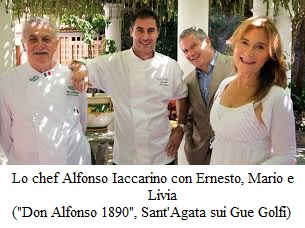 D: Can the trilogy be considered closed with this novel? Or will there be a sequel?
D: Can the trilogy be considered closed with this novel? Or will there be a sequel?
R: “The Sorrentine Trilogy”, the way I intended and projected it, will not have another part. It would be a contradiction: thesis, antithesis and synthesis. Stop.
D: And yet there are talks in Sant’Agata sui Due Golfi of a literary homage to my native village? Is it just a gossip?
R: Like you, I love Sant’Agata sui Due Golfi, because my parents spent some wonderful years of their elderly age there, I am the honorary brother of the Brotherhood of the Holy Rosary, I am a true friend and admirer of Livia and Alfonso Iaccarino and, finally, I am a fan of limoncelle apples, unfortunately, very hard to find for me these days.
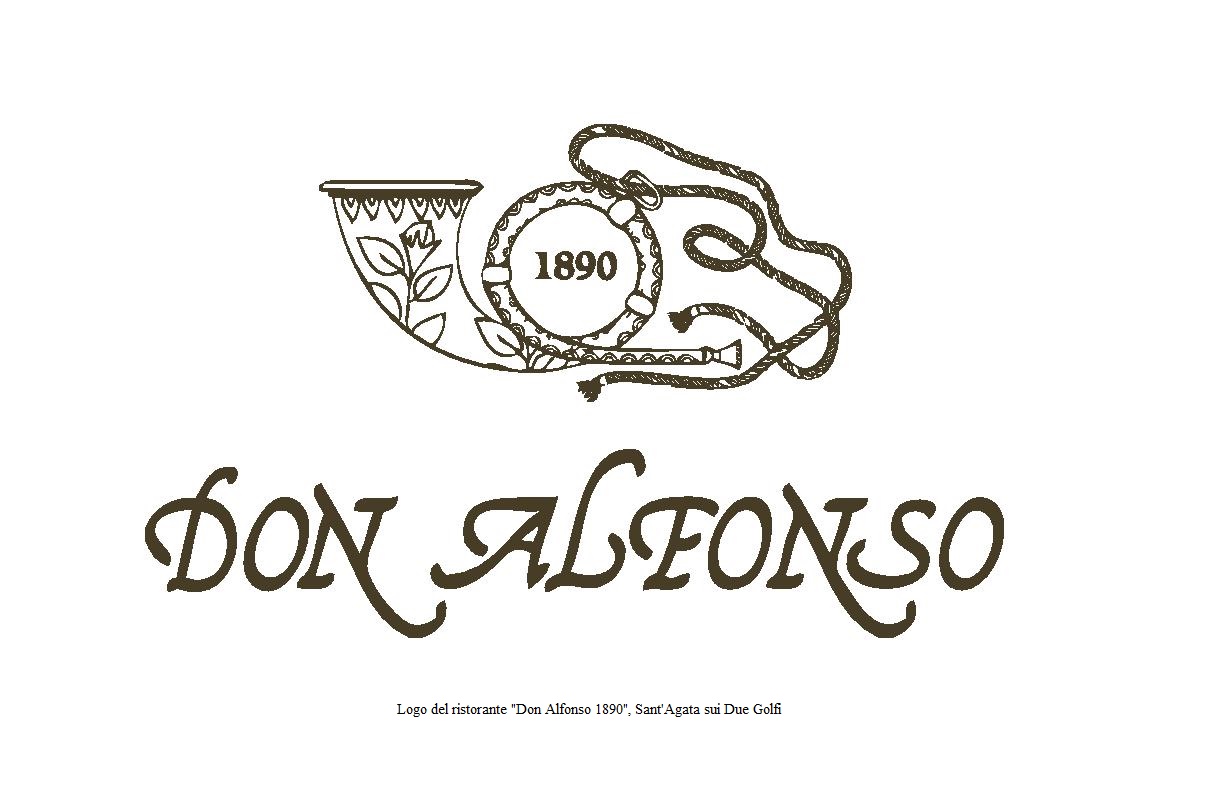 D: And?
D: And?
R: I will certainly fulfil my debt of gratitude!
Prof. never ever stops surprising us!
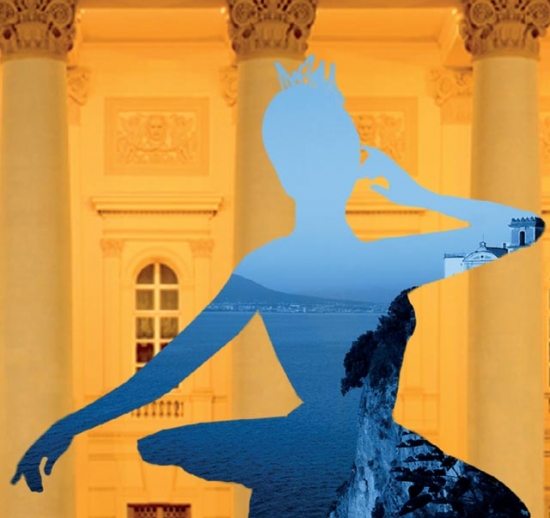
 [..]
[..]  [..]
[..]  Carissime, Carissimi, desidero ringraziare, di cuore, quanti hanno tempestivamente aderito al mio invito a votare e far votare, nel concorso Rai “Il Borgo dei Borghi”, la [..]
Carissime, Carissimi, desidero ringraziare, di cuore, quanti hanno tempestivamente aderito al mio invito a votare e far votare, nel concorso Rai “Il Borgo dei Borghi”, la [..]  "Paradossalmente le ultime vicende parlamentari sulla delega fiscale e il voto, per un soffio, sul catasto, stanno testimoniando come la complicata emergenza della guerra in Ucraina, piena di [..]
"Paradossalmente le ultime vicende parlamentari sulla delega fiscale e il voto, per un soffio, sul catasto, stanno testimoniando come la complicata emergenza della guerra in Ucraina, piena di [..]